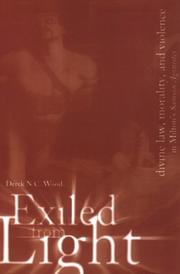| Listing 1 - 1 of 1 |
Sort by
|

ISBN: 1282033816 9786612033810 1442674717 9781442674714 9781282033818 080204848X 9780802048486 6612033819 Year: 2001 Publisher: Toronto
Abstract | Keywords | Export | Availability | Bookmark
 Loading...
Loading...Choose an application
- Reference Manager
- EndNote
- RefWorks (Direct export to RefWorks)
Despite considerable general disagreement about the meaning of Milton's Samson Agonistes, literary critics have largely come to view, Samson, as a saintly Christian hero, with attending themes of election, conversion and regeneration. In a challenge to this dominant interpretation, Derek Wood proposes that Milton's protagonist is actually an emblematic embodiment of Old Testament consciousness as a rigorous, incomplete, literalistic and uncomprehending, fashioned by the old Mosaic Law, without the amelioration of Christ's charity and forgiveness. Wood begins by surveying and evaluating the critical literature on Samson Agonistes of the past fifty years, then challenges these readings through a comprehensive textual and formal analysis. He argues for a thorough understanding of Artistotle's theory of tragedy, in which Milton's practice was anchored and draws cogently on early modern European commentaries as well as contemporary re-evaluations of Aristotle's Poetics to clarify Milton's approach. Wood's contribution reconciles the orthodox interpretation of Samson as a Christian saint with the revisionist emphasis on his murderous brutality. The author's analysis corrects a number of errors made by previous Milton scholars, shows how Dalila has been consistently misread and decodes the politics of the tragedy in the context of Milton's final years as an aging, failed revolutionary.
LITERARY CRITICISM / European / English, Irish, Scottish, Welsh. --- Milton, John, --- Samson --- Samson, --- Shimshon --- Shimshoni, --- Shimshūn --- Simson --- שמשוני --- שמשון --- In literature. --- Violence in literature. --- Ethics in literature. --- Bible and law. --- Law and the Bible --- Law --- Samson Agonistes (Milton, John) --- Milton's Samson Agonistes (Milton, John)
| Listing 1 - 1 of 1 |
Sort by
|

 Search
Search Feedback
Feedback About UniCat
About UniCat  Help
Help News
News